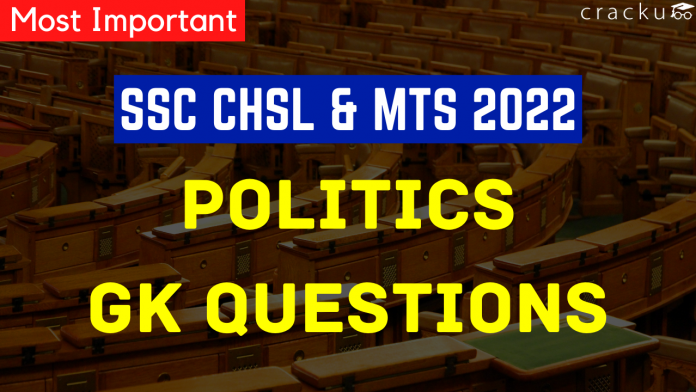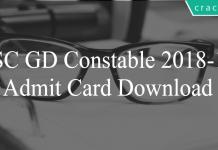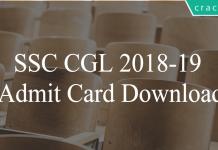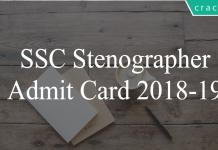SSC CHSL and MTS – General Knowledge Politics Questions PDF
Here you can download the Politics Questions for SSC CHSL and MTS PDF with solutions by Cracku. These are the most important Politics questions PDF prepared by various sources also based on previous year’s papers. Utilize this PDF for Politics for SSC CHSL and MTS. You can find a list of Politics in this PDF which help you to test yourself and practice. So you can click on the below link to download the PDF for reference and do more practice.
Download Politics Questions for SSC CHSL and MTS
Enroll to 15 SSC CHSL 2022 Mocks At Just Rs. 149
Question 1: Article 356 of the Constitution of India provides for
a) Reservation of the jobs for backward classes
b) Protection of religious monument
c) Imposition of President’s rule in a State
d) Right to Education
1) Answer (C)
Question 2: Which of the following do not come under the Fundamental Rights?
a) Right to Freedom
b) Right to Equality
c) Right against Exploitation
d) Right to Property
2) Answer (D)
Solution:
Right to Property does not come under the Fundamental Rights.
Question 3: Which of the following articles deals with “Right to Constitutional Remedies”?
a) Article 32
b) Article 33
c) Article 34
d) Article 35
3) Answer (A)
Solution:
Article 32 deals with “Right to Constitutional Remedies”.
Question 4: The Eighth schedule of the Indian constitution deals with ___?
a) Abolition of Zamindari system
b) Official languages
c) Administration of tribal areas in Assam, Meghalaya, Tripura and Mizoram
d) Name of States and Union Territories
4) Answer (B)
Solution:
The Eighth schedule of the Indian constitution deals with Official languages.
Question 5: Who is the second prime minister of India?
a) Jawaharlal Nehru
b) Lal Bahadur Shastri
c) Morarji Desai
d) Indira Gandhi
5) Answer (B)
Solution:
Lal Bahadur Shastri ji was the second prime minister of India.
Question 6: Which of the following finance ministers discontinued the tradition of representing the Union Budget and Railway Budget separately?
a) Morarji Desai
b) Arun Jaitley
c) Nirmala Sitharaman
d) Yashwant Sinha
Take a free SSC CHSL Tier-1 mock test
Download SSC CGL Tier-1 Previous Papers PDF
6) Answer (B)
Solution:
Arun Jaitley discontinued the tradition of representing the Union Budget and Railway Budget separately.
Hence, option b is the correct answer.
Question 7: Under which article of Indian constitution a constitutional amendment bill can be represented?
a) Article 352
b) Article 360
c) Article 368
d) Article 356
7) Answer (C)
Solution:
Under Article 368 of Indian constitution a constitutional amendment bill can be represented.
Hence, option c is the correct answer.
Question 8: What is the minimum age needed to become a member of Rajya Sabha?
a) 40 years
b) 30 years
c) 35 years
d) 25 years
8) Answer (B)
Solution:
The minimum age needed to become a member of Rajya Sabha is 30 years.
Hence, option b is the correct answer.
Question 9: Which of the following is not a type of Veto power of the President?
a) Instant Veto
b) Absolute Veto
c) Suspensive Veto
d) Pocket Veto
9) Answer (A)
Solution:
Instant Veto is not a type of Veto power of the President.
Hence, option a is the correct answer.
Question 10: How many fundamental rights (including the ‘Right to property’) were provided by the constitution of India originally to its citizens?
a) 8
b) 7
c) 6
d) 9
10) Answer (B)
Solution:
Seven fundamental rights were provided by the constitution of India originally to its citizens. Later on ‘Right to property’ was removed and right now only six fundamental rights are there.
Hence, option b is the correct answer.
Question 11: What is the tenure of a Panchayat?
a) 1 years
b) 5 years
c) 6 years
d) 4 years
11) Answer (B)
Solution:
The tenure of a Panchayat is 5 years.
Hence, option b is the correct answer.
Question 12: Which of the following political party’s symbols is ‘Conch’?
a) LJP
b) BJD
c) GFP
d) RJD
12) Answer (B)
Solution:
BJD’s symbol is ‘Conch’.
Hence, option b is the correct answer.
Question 13: Which of the following articles of the Indian constitution gives the power to promulgate ordinances?
a) Article 213
b) Article 123
c) Article 239
d) Article 147
13) Answer (B)
Solution:
Article 123 of the Indian constitution gives the power to promulgate ordinances.
Hence, option b is the correct answer.
Question 14: National foundation for communal harmony was set up in which year?
a) 1989
b) 1992
c) 1978
d) 1972
14) Answer (B)
Question 15: Panchayat raj system was introduced in India in which Year?
a) 1950
b) 1962
c) 1954
d) 1959
15) Answer (D)
Question 16: Who administers the oath of President of India?
a) Speaker of Lok sabha
b) Chief Minister
c) chief justice of India
d) Vice-president
16) Answer (C)
Question 17: Which act made central legislature Bicameral?
a) Government of India act 1919
b) Government of India act 1858
c) Government of India act 1861
d) Indian council act, 1909
17) Answer (A)
Question 18: Appointment of all Indian services are made by ?
a) Prime Minister
b) Speaker
c) President
d) Vice-President
18) Answer (C)
Question 19: What is the largest committe of Indian Parliament?
a) Estimates committe
b) Public Accounts committe
c) Public Undertaking committe
d) None of the above
19) Answer (A)
Question 20: Which Article of the Constitution of India states the directive principles of state policy on ‘promotion of international peace and security’?
a) Article 51
b) Article 69
c) Article 62
d) Article 49
20) Answer (A)
Question 21: Who decides allotment of symbols to the political parties?
a) Election commission
b) Party Leaders
c) People
d) Political party governing leaders.
21) Answer (A)
Question 22: The concept of Directive principles of state policies are derived from which constitution?
a) Irish Constitution
b) Russian Constitution
c) French constitution
d) Australian constitution
22) Answer (A)
Question 23: India signed Panchsheel Treaty with which country?
a) Nepal
b) China
c) Pakistan
d) Bangladesh
23) Answer (B)
Question 24: When was the construction of the Rashtrapati Bhavan completed?
a) 1959
b) 1953
c) 1949
d) 1929
24) Answer (D)
Question 25: The period of 12th Five Year Plan was:
a) 2007 – 2012
b) 2002 – 2007
c) 2012 – 2017
d) 1997 – 2002
25) Answer (C)
Question 26: Who has been elected as the new Jharkhand assembly speaker?
a) Alamgir Alam
b) CP Singh
c) Rabindra Nath Mahto
d) Inder Singh Namdhari
26) Answer (C)
Question 27: As of Feb 2020, how many members represent the state of Uttar Pradesh in Lok Sabha?
a) 48
b) 39
c) 80Po
d) 62
27) Answer (C)
Question 28: Which of the following states is included in the sixth schedule of the Constitution of India?
a) Mizoram
b) Nagaland
c) Arunachal Pradesh
d) Manipur
28) Answer (A)
Question 29: Which Article of the Indian Constitution specifies the fundamental duties of every citizen?
a) 51A
b) 80
c) 81
d) 343
29) Answer (A)
Question 30: Under which schedule of constitution POlice is under state list?
a) 7th
b) 3rd
c) 5th
d) 2nd
30) Answer (A)





